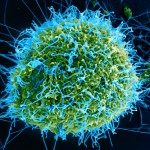Lien vers Pubmed [PMID] – 19706700
J. Virol. 2009 Nov;83(21):10963-74
AIDS vaccination has a pressing need for more potent vaccination vectors capable of eliciting strong, diversified, and long-lasting cellular immune responses against human immunodeficiency virus (HIV). Lentiviral vectors have demonstrated efficiency not only as gene delivery vehicles for gene therapy applications but also as vaccination tools. This is likely due to their ability to transduce nondividing cells, including dendritic cells, enabling sustained endogenous antigen presentation and thus the induction of high proportions of specific cytotoxic T cells and long-lasting memory T cells. We show in a first proof-of-concept pilot study that a prime/boost vaccination strategy using lentiviral vectors pseudotyped with a glycoprotein G from two non-cross-reactive vesicular stomatitis virus serotypes elicited robust and broad cellular immune responses against the vector-encoded antigen, simian immunodeficiency virus (SIV) GAG, in cynomolgus macaques. Vaccination conferred strong protection against a massive intrarectal challenge with SIVmac251, as evidenced both by the reduction of viremia at the peak of acute infection (a mean of over 2 log(10) fold reduction) and by the full preservation of the CD28(+) CD95(+) memory CD4(+) T cells during the acute phase, a strong correlate of protection against pathogenesis. Although vaccinees continued to display lower viremia than control macaques during the early chronic phase, these differences were not statistically significant by day 50 postchallenge. A not-optimized SIV GAG antigen was chosen to show the strong potential of the lentiviral vector system for vaccination. Given that a stronger protection can be anticipated from a modern HIV-1 antigen design, gene transfer vectors derived from HIV-1 appear as promising candidates for vaccination against HIV-1 infection.

